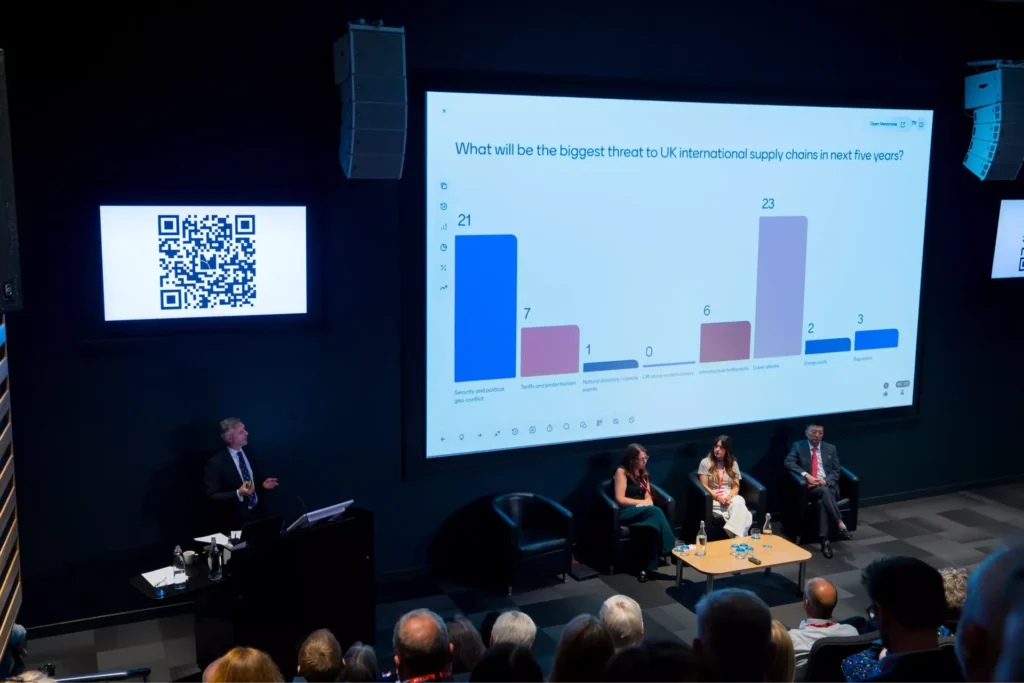
With global supply chains under increasing pressures from geopolitical conflict, cyber threats, and shifting trade dynamics, businesses are being forced to rethink long-established strategies, trade routes, and networks.
Against this backdrop, SCALA welcomed over 150 senior professionals to Coventry’s Advanced Manufacturing Technology Centre in June for our 22nd Annual Supply Chain Debate.
The event brought together leading voices from the worlds of manufacturing, logistics, retail, and academia to explore one of the most pressing questions facing industry today:
Is it time to shift our global supply chain strategies?
As ever, the debate featured lively discussion, real-time audience polling, and insight from expert panellists representing organisations including Jordans Dorset Ryvita, Tangle Teezer, and the author of The Death of Globalization.
What emerged was a powerful snapshot of an industry in transition, and a clear consensus that building resilient, future-ready supply chains requires fresh thinking, flexible models, and a readiness to adapt to complexity.
Key insights from the day
The debate revealed insights into the risks and opportunities ahead:
- Almost three-quarters of respondents believed global supply chains are shifting: 71% of attendees said the supply chain landscape is transitioning towards more regionalised, hybrid models.
- Geopolitics and cyber threats dominate the risk agenda: 37% cited geopolitical conflict as the top threat to UK international supply chains, closely followed by cyberattacks (33%) – a hot topic in the media of late.
- Globalisation isn’t dead – but it’s evolving: over half (51%) of respondents remain committed to global operations, while 38% are balancing global and regional sourcing. And notably, 94% believe the current trade tariff war will strengthen Euro-Asian ties.
Diverse perspectives, common goals This year’s panel featured thought leaders from across the breadth of the supply chain industry who put forward their cases around the future of globalisation.
- Tiger Wang (chairman of China-based Ocean Business Group and co-chairman of SCALA China) championed the role of globalised supply chains in economic development but called for greater policy collaboration to reduce risk and build resilience.
- Jenn Smiley (Head of customer supply & logistics at Jordans Dorset Ryvita) focused on navigating complexity through strategic logistics partnerships and product diversification.
- Kirsty Lantos (COO at Tangle Teezer) reinforced the strategic value of their global model – even amid changing consumer expectations.
- Professor John Manners-Bell (founder of the Foundation for Future Supply Chain and author of The Death of Globalization) mused that globalisation has peaked and argued that the UK must invest in automation and nearshoring to build greater resilience.
Reframing supply chain resilience
Reflecting on the debate, SCALA Executive Director and chair of the event, Chris Clowes, noted that while globalisation remains a powerful force, it is no longer the default strategy for supply chain success. The consensus was clear: hybrid models that blend global reach with regional resilience are increasingly becoming the norm.
True resilience, however, is not just about geography. It’s about leadership, design, and adaptability, and how organisations structure and manage their supply chains in the face of ongoing disruption.
Looking ahead
As the world of global trade remains volatile, building supply chains that can flex, respond, and recover quickly is more essential than ever. SCALA continues to work closely with businesses to design future-ready strategies that account for geopolitical shifts, cyber threats, and sustainability challenges.
If you would like to explore how SCALA can support your supply chain transformation, please contact us.
